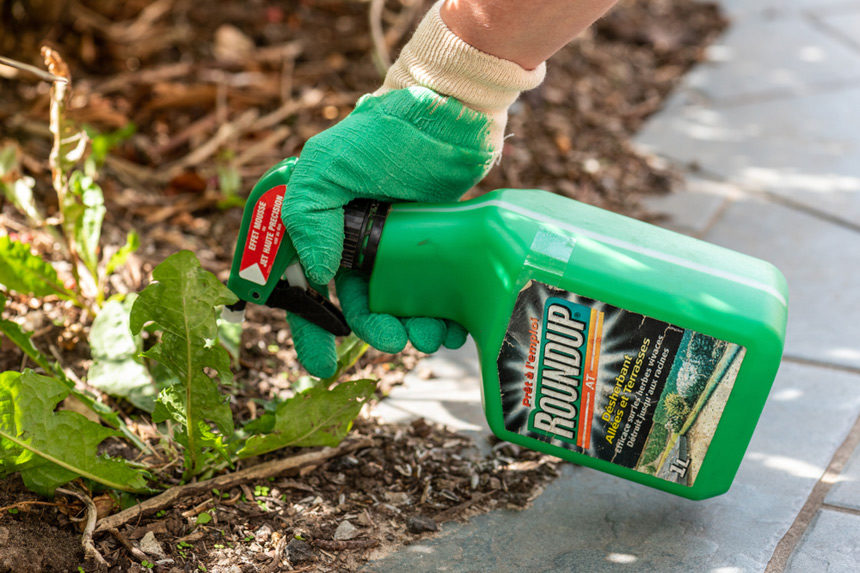“Your Health Checkup” is our online column by Dr. Douglas Zipes, an internationally acclaimed cardiologist, professor, author, inventor, and authority on pacing and electrophysiology. Dr. Zipes is also a contributor to The Saturday Evening Post print magazine. Subscribe to receive thoughtful articles, new fiction, health and wellness advice, and gems from our archive.
Order Dr. Zipes’ new book, Damn the Naysayers: A Doctor’s Memoir.
Monsanto’s Roundup, the world’s most popular herbicide, contains glyphosate, and is used to control weeds in agriculture, forestry, and urban and suburban locations. Many crops have been altered genetically to resist the effects of glyphosate to make certain the herbicide spares the crops and only kills unwanted growth.
If you are a gardener, it is likely you will use Roundup this spring to kill weeds.
After application, glyphosate has been detected in drinking water, food, and in the air. The observed levels in the body are generally low. But increased use of glyphosate is leading to rising human exposure.
The major cause for concern with Roundup is whether glyphosate is a carcinogen capable of initiating non-Hodgkin lymphoma. Almost 1800 articles have been published about glyphosate, with conflicting results regarding its carcinogenic capabilities.
Non-Hodgkin lymphoma patients who used Roundup started suing Monsanto after a 2015 World Health Organization report suggested that glyphosate might cause cancer. WHO’s International Agency for Research on Cancer reported that glyphosate is “probably carcinogenic to humans.”
A federal jury recently awarded $80 million to a California man after determining that Roundup was a substantial factor in causing the man’s non-Hodgkin lymphoma, and that the corporation was liable. Bayer, the parent company of Monsanto, said it would appeal the verdict.
Some experts question whether regulatory estimates of tolerable daily exposure for glyphosate are based on outdated science. They suggest the need for new studies in epidemiology, biomonitoring, and toxicology to determine whether glyphosate is toxic to humans. They recommend that prospective studies include government-led toxicology testing programs such as the U.S. National Toxicology Program, as well as for biomonitoring as conducted by the U.S. Centers for Disease Control and Prevention.
It is important to remember that many farm products can be contaminated, not just with herbicides, but also with pesticides that include a wide array of chemicals to kill unwanted insects, plants, molds, and rodents. Spinach, nectarines, apples, grapes, peaches, cherries, pears, strawberries, tomatoes, celery, potatoes, eggplant, and sweet bell peppers each tested positive for pesticide residues and contained higher concentrations of pesticides than other produce. The tests indicated that nearly 70% of conventionally grown — non-organic — produce samples were contaminated.
The information comes from tests performed by the U.S. Department of Agriculture and the Food and Drug Administration on more than 38,800 non-organic samples. Children are of special concern as younger bodies appear more susceptible to the effects of pesticides than adults. Pesticides may induce chronic health complications in children, including neurodevelopmental or behavioral problems, birth defects, asthma, and cancer, noted the authors of a pediatric report. Other studies indicate that a child’s earliest exposure to pesticides —through the mother during pregnancy — may also be harmful.
However, the most recent Pesticide Data Program report issued by the U.S. Department of Agriculture indicates that when pesticide residues are found on foods, they are nearly always at levels below the human tolerance limits set by the U.S. Environmental Protection Agency.
What should you do? Rinsing produce under tap water is an effective way to eliminate pesticide residues, according to the Connecticut Agricultural Experiment Station.
My advice: use the minimum amount of Roundup that is effective for your needs; stay away from fields where Roundup has been recently applied; and rinse all fresh produce with tap water for at least 30 seconds before using.
Featured image: Shutterstock.com
Become a Saturday Evening Post member and enjoy unlimited access. Subscribe now




Comments
Plain white vinegar works great on broad-leaf weeds like ground ivy, dandelions, and native mustard.
This whole feature, way before the end, really concludes that Roundup (though effective) is a health hazard all around and should be avoided at all costs, period. The fact it’s manufactured by Monsanto in the first place should have alarm bells going off!!
Getting rid of weeds IS an important part of Spring cleaning for the outside of the home, and a safe yet effective alternative to do that is Avenger Organic Weed Killer. You can find/buy it online. I’m not sure if it’s sold at Home Depot or Lowe’s. It should be, but so should a lot of things. You might wind up buying something similar to Roundup without realizing it, that’s harmful because you wanted to get all the supplies in the one trip. It’s not worth it at all if it’s putting people and animals health at serious risk.